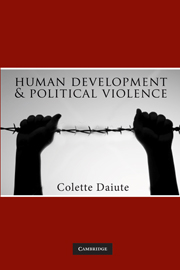Book contents
- Frontmatter
- Contents
- List of Figures
- List of Tables
- Preface
- 1 Beyond the Youth Gap in Understanding Political Violence
- 2 Youth and Society Work Together
- 3 Living History
- 4 Critical Narrating
- 5 Participation Matters
- 6 Sociobiographies
- 7 Human Development in Conflict
- Appendix: Examples of Public Stories across Positions in the DSTY Research Workshop
- References
- Index
2 - Youth and Society Work Together
Published online by Cambridge University Press: 05 June 2012
- Frontmatter
- Contents
- List of Figures
- List of Tables
- Preface
- 1 Beyond the Youth Gap in Understanding Political Violence
- 2 Youth and Society Work Together
- 3 Living History
- 4 Critical Narrating
- 5 Participation Matters
- 6 Sociobiographies
- 7 Human Development in Conflict
- Appendix: Examples of Public Stories across Positions in the DSTY Research Workshop
- References
- Index
Summary
This chapter presents a practical research design to learn about young people's experiences of political violence and transition. The Dynamic Story-Telling by Youth (DSTY) research workshop involves young people aged 12 to 27 across four countries resulting from the recent wars to learn about how they interact with the circumstances where they find themselves. Before discussing this theory-based research design, I present vignettes based on fieldnotes, project archives, and reports to offer insights about the workshop settings. These vignettes focus on the workshops, which occurred in the context of community participation, like that pictured in Figure 2.1 and as appropriate to urban as well as rural settings.
SERBIA, AUGUST
It's a Saturday in August when 31 young people could have been picnicking near the river, sitting with their friends at a café, or helping out at home. Instead, these young people came looking curious, if not enthusiastic, to former government buildings to participate in a workshop eliciting youth voices and to communicate with other youth across the region. Recruited through an NGO active since the war in positive social change, the youth gathered in now-underused buildings in what was the capital of Yugoslavia when the participants were young children. The research workshop is led in their language by a young Serbian man now studying for a Ph.D. in the United States and a local educator, with assistance from two other young adults living in Belgrade.
- Type
- Chapter
- Information
- Human Development and Political Violence , pp. 35 - 75Publisher: Cambridge University PressPrint publication year: 2010



